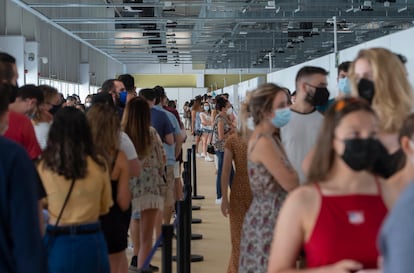Covid deaths in Spain triple in two weeks due to fifth wave
In the past 14 days, the number of weekly fatalities has grown from 32 to 98, while the incidence rate continues to rise

First cases go up, then around two weeks later the number of hospital admissions rises and lastly there is an increase in Covid-19 deaths. This has been the pattern of previous coronavirus waves in Spain and that is what is happening again in the fifth wave. This time, however, the absolute number of fatalities is much lower thanks to the Covid-19 vaccination drive.
According to the latest figures from the Spanish Health Ministry, released Monday evening, 98 people in Spain have died after testing positive for the virus in the last seven days. That is nearly double the 50 weekly fatalities reported last Monday and triple the 32 recorded two weeks ago. The figures indicate a clear trend, although it is likely these numbers are even higher due to delays in death notifications. The Health Ministry, for example, added 149 deaths to the official toll on Monday. These fatalities had occurred in previous weeks but had not been added to the historical series.

According to Monday’s figures, 61,625 new coronavirus cases have been detected since Friday (no data is released on Saturdays and Sundays). This is nearly the same number reported last Monday, when 61,628 infections were detected over the weekend, indicating that the incidence rate is stabilizing. The 14-day cumulative number of cases per 100,000 inhabitants now stands at 700. But while the national incidence rate may be stabilizing, the situation in Spain’s regions varies greatly, according to Silvia Calzón, the secretary of state for health.
In Catalonia, Castilla y León and Asturias, three regions that have been among the hardest hit by the fifth wave, the incidence rate has started to fall. Meanwhile, cases continue to spike in nearly half of Spain’s 17 regions. The rise has been particularly significant in Madrid, the Basque Country, Galicia, La Rioja and Murcia, where infections have jumped by around 50% in the last seven days.
Speaking at a press conference on Monday, Calzón explained that the positivity rate – i.e. the percentage of coronavirus tests that come back positive out of the total – continues to be high, coming in at 16%. This data point “is especially high in the 10-19 and 20-29 age groups, where it is around 23%,” said Calzón.
The fifth wave is continuing to strain Spain’s hospitals, but Calzón said that is having “less of an impact than previous waves.” There are currently 9,384 Covid-19 patients in hospital, 45% more than last week, of whom 1,490 are in intensive care units (ICUs), a rise of 43%.
The national 14-day cumulative number of cases per 100,000 inhabitants now stands at 700
The pressure on hospitals is most acute in Catalonia, which has had the highest incidence rate in Spain for the past four weeks. The 14-day cumulative number of cases per 100,000 inhabitants in the region continues to exceed 1,000. Covid-19 patients occupy 44% of all ICU beds in Catalan hospitals, a figure that far outstrips the occupancy rate in the Balearic Islands (18%) and La Rioja (17%), which have the next highest rates.
Calzón explained that the average age of Covid-19 patients continues to fall and is now between “45 and 50” for those admitted to a normal ward, while those in the ICU are “in their fifties.”
During the press conference, Calzón also spoke about the recent statements made by Health Minister Carolina Darias. Last week, Darias said “everything is pointing to” the need for a third dose of Covid-19 vaccines and that there was no doubt that residents of Spain would need to be vaccinated against the virus every year. This position went further than what has been approved by regulatory agencies such as the European Medicines Agency and the US Food and Drug Administration.
With respect to this issue, Calzón said “there is an open scientific debate” and added that some countries have begun to administer a third dose of a Covid-19 vaccine to very small and specific groups, such as immunosuppressed individuals. The state secretary did not make any further comment, except to say that Darias was “waiting” to see what the scientific evidence indicated. Research suggests that a third dose is not needed, given that the current vaccines available are effective against all variants of the coronavirus that have been detected so far.
Calzón also announced that the 750,000 doses donated by Spain via Covax, a global initiative led by the World Health Organization aimed at guaranteeing equitable access to vaccines, “will go to Guatemala, Ecuador, Paraguay, Peru and Nicaragua.” “These vaccines are not coming out from those that have arrived in Spain, but rather via an agreement with the company that will send them to those countries.”
English version by Melissa Kitson.
Tu suscripción se está usando en otro dispositivo
¿Quieres añadir otro usuario a tu suscripción?
Si continúas leyendo en este dispositivo, no se podrá leer en el otro.
FlechaTu suscripción se está usando en otro dispositivo y solo puedes acceder a EL PAÍS desde un dispositivo a la vez.
Si quieres compartir tu cuenta, cambia tu suscripción a la modalidad Premium, así podrás añadir otro usuario. Cada uno accederá con su propia cuenta de email, lo que os permitirá personalizar vuestra experiencia en EL PAÍS.
¿Tienes una suscripción de empresa? Accede aquí para contratar más cuentas.
En el caso de no saber quién está usando tu cuenta, te recomendamos cambiar tu contraseña aquí.
Si decides continuar compartiendo tu cuenta, este mensaje se mostrará en tu dispositivo y en el de la otra persona que está usando tu cuenta de forma indefinida, afectando a tu experiencia de lectura. Puedes consultar aquí los términos y condiciones de la suscripción digital.









































